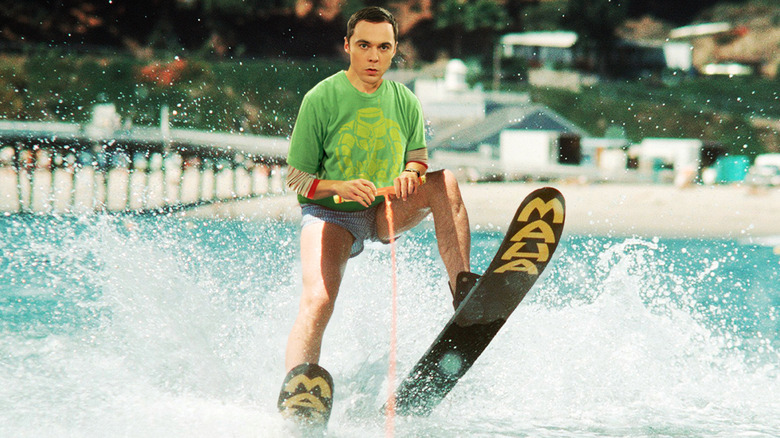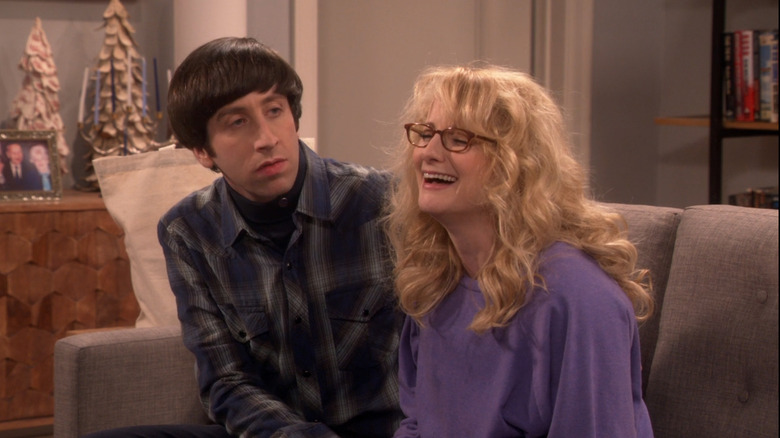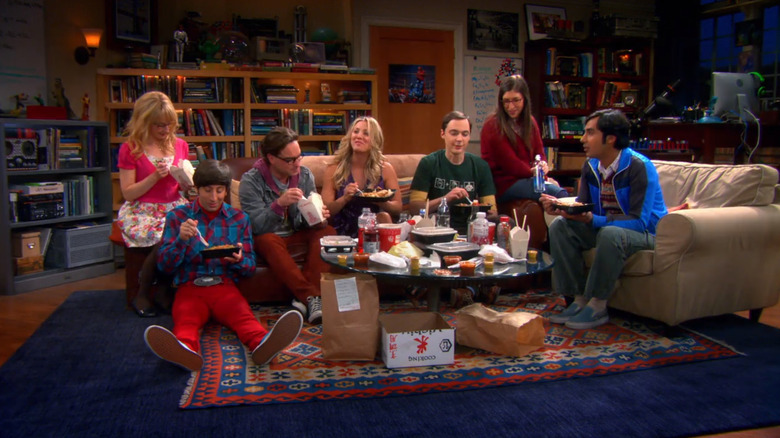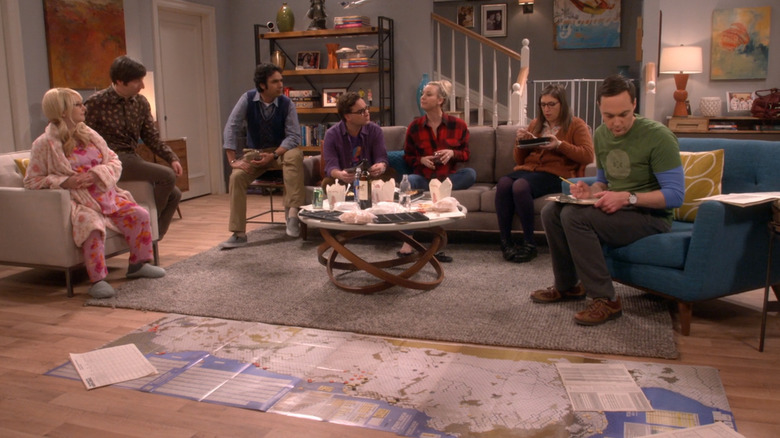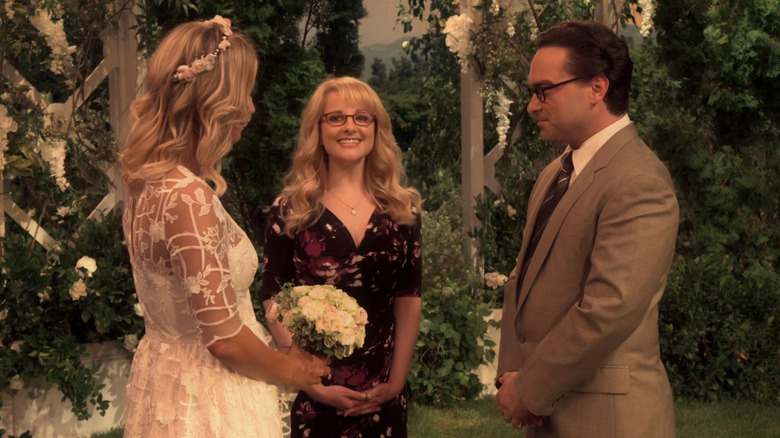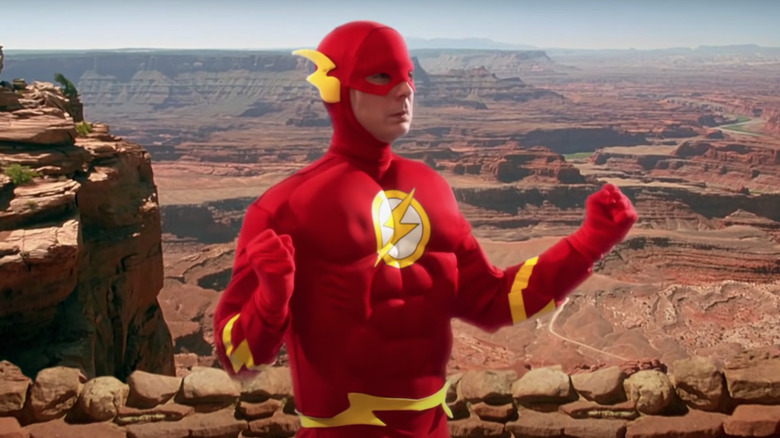This Is The Exact Moment The Big Bang Theory Jumped The Shark
"The Big Bang Theory," one of television's longest-running and most celebrated sitcoms, played a role in propelling nerd culture from the fringes to the mainstream discourse it is today. As "Star Wars" and the Marvel Cinematic Universe overtook pop culture, "The Big Bang Theory" broke stereotypes and opened up conversations. 12 years is a long time, though, and over the course of that run, even "The Big Bang Theory" fell prey to a common pitfall on television referred to as "jumping the shark."
This unfortunately common event in TV programs — a reference to the infamous episode of "Happy Days" where The Fonz (Henry Winkler) unbelievably leaps on water skis over an enclosed, man-eating shark — generally refers to a moment where a show's well dries up, stories go dry, and focus is lost. And while you won't find any shark-jumping physicists on "The Big Bang Theory," there is one storyline that irrevocably changed the show, even resulting in a drop in viewership.
To be fair, it's both undeniable and understandable that a series needs to grow and evolve with its audience. At a certain point, though, the originality and abundance of relevant pop-culture references that once made "The Big Bang Theory" so distinctive, reliable, and relatable fell to the wayside in favor of romantic plots. And that moment, fellow viewers, unfolds when the central group of friends drift apart and form families of their own, thereby severing the screen time shared between characters.
Howard and Bernadette's first baby permanently changed the show's dynamic
The tone of "The Big Bang Theory" first shifted when the core cast of geeky men entered flourishing relationships with brilliant and independent women. The welcome addition of Bernadette (Melissa Rauch) and Amy (Mayim Bialik), gave the series a fresh perspective and empowering stance that was sorely needed. The awkward and gawking boys became responsible and respectful men, who would even become capable fathers. While this growth is natural in life, it also divorced the series from its original unique premise to instead posit it as something far more similar to other relationship-focused shows like "Friends."
The life-changing storyline where Howard (Simon Helberg) and Bernadette have Halley isn't exactly a far-fetched concept in itself, but it is the moment where the tides forever change course. Furthermore, while "The Big Bang Theory" could have used Halley's birth to make Howard grow and mature, he instead remains fairly stunted, as Stuart (Kevin Sussman) and Raj (Kunal Nayyar) pick up his slack. This ushers in a regrettable decline in quality, made worse when less believable events ensue like the top secret Air Force project.
Here's the point, though: "The Big Bang Theory" started losing steam here because while it's great to see characters evolve, the new little one on board was the point where it became two very different shows crammed together, both unfocused and unwilling to fully pivot to the new show it seemed to want to be. Even worse, it divided the cast, with Raj and Stuart as team baby at home, while Sheldon (Jim Parsons), Penny (Kaley Cuoco), Leonard (Johnny Galecki), and Amy stayed at the apartment complex.
The Big Bang Theory grew to feel less about the ensemble cast
After Halley is born, this harsh divide begins to split the gang in numerous conflicting ways as careers advance and relationships blossom. Again, that's realistic, but it clearly makes the point that the show should have ended before this happened. The once-stunted bachelors couple up, and unfortunately, this also means they spend less time together, while they plan their individual futures with their significant others. This defies the very thematic introduction of "The Big Bang Theory," which celebrates and emphasizes their enduring friendship by having them routinely come together over a meal.
This is exemplified in Season 10, Episode 15, "The Locomotion Reverberation," when Penny expresses her frustration about the pressure to become a parent. She groans over the idea of diapers, 401ks, and suburban life, which echoes the very shift the series was enduring. In "The Comic-Con Conundrum," as the gang eagerly plans for their annual trip, it soon falls through when life gets in the way. Howard finds himself saddled with responsibility and unable to flee to the sacred nerd haven. After an exhausting back and forth, Leonard and Penny (who didn't want to go anyway), also drop out of the occasion. Raj can't afford to go with his newfound financial independence, which leaves Sheldon alone, until he relents into also staying home with Amy. This dwindling fallout is a perfect example of the downward slope soon to follow as we move away from the geeky references that convinced people to follow the show in the first place. Fittingly enough, these sequences were followed by the announcement of the prequel series "Young Sheldon" in 2017, following the early years of titular genius.
While the family focus fits Young Sheldon, it's not what we signed up for on The Big Bang Theory
Though the later seasons of "The Big Bang Theory" still have remnants of the show's glory days, by then it has shed its prior originality to (mostly) fit into a trope-filled family sitcom-shaped hole that nobody asked for. To be clear, there's nothing wrong with family sitcoms. In fact, this formula works perfectly for the hometown stories on "Young Sheldon." On the parent program, though, it meant dropping the show's essence to the point where it was more reminscent of Cuoco's time on "8 Simple Rules" than the show viewers had signed up for. As in-laws bicker and wedding bells ring, the core group of friends rarely engage in their nerdy hobbies, and if they do, it's at the expense of a more pressing issue like Bernadette's delayed labor.
In Season 11's "The Neonatal Nomenclature," Sheldon tricks the friends into getting together so he can organize a sprawling, and time consuming, conquest game. In the early days of "The Big Bang Theory," this would've been the central A plot, with Sheldon's wacky, self-centered antics hogging the spotlight. However, because of the new focus on diapers and engagement rings, this gets put on the back burner as the episode's subplot. The series even changes visually from the iconic California apartment (complete with authentic fan memorabilia like Jon Snow's sword from "Game of Thrones," and Sheldon's specific seat on the couch), to Howard and Bernadette's newly remodeled suburban home. Again, this fits the family ties in "Young Sheldon," but is not the geeky friendship comedy "The Big Bang Theory" once was.
The Big Bang Theory experienced a steady ratings decline after it jumped the shark
Following the new parent mania in Season 9, viewers began to steadily drop off until the final season (via Statista). Though the series finale saw an explosive jump in viewership (as per Deadline), "The Big Bang Theory" never regained the massive audience it secured in Season 7, proving fans think the best era was the earlier years.
However, that's not to say the last three seasons didn't have their fair share of memorable moments, including the unforgettable final episode. There, Leonard and Penny finally tied the knot in a beautiful ceremony, bringing a slew of exciting guest stars into the mix (including Cuoco's former "8 Simple Rules" co-star Katey Sagal). In the momentous two-part Season 11 finale, Sheldon and Amy said "I do" in a heartwarming sequence fans surely won't forget. And even as the series faced its final days, it balanced the tender scenes with side-splitting jokes until the very end.
While the progression of events on "The Big Bang Theory" is natural and relatable, and the series remained enjoyable throughout, the segue from nerdy group of friends to relationship comedy was clearly the turning point where it ceased to be the same show. Looking back, who could forget the outlandish, fanboy jams by Howard and Raj? Or when Howard found Mark Hamill's dog? The later seasons didn't hold the same comic gems, and by the end, it was mostly just baby fever for everyone – even Sheldon!
How could The Big Bang Theory have avoided jumping the shark?
When you put "The Big Bang Theory" under a microscope, you'll find the real enemy may be time itself. It's possible the series simply lasted too long. At a certain point, perhaps it had no choice but to stretch the narrative beyond the scope of that original, established premise of socially awkward friends navigating life together.
In that regard, shark-jumping aside, it's important to celebrate the infusion of new cast members that occurred — they're the ones who prevented the original characters from falling into stagnant caricatures, particularly the stubborn Sheldon. Amy's love and patience changed Sheldon for the better, which helped him be less selfish, more empathetic, and even more social within his growing friend group. This ultimately paid off in the series finale, when he took time out of his Nobel Prize acceptance speech to individually thank each of his friends. In the end, Sheldon (and Jim Parsons, whose decision to leave ended "The Big Bang Theory" after 12 seasons) grew up and put his comic book collection away.
If this were real life and real people, the progression of familial events depicted on "The Big Bang Theory" would be positive and believable. On TV, though, it's the straw that broke the eopie's back. Longtime viewers of the accomplished series still tuned in post-shark jump, though they can't deny it wasn't the same show anymore. Action figures were traded for baby dolls, video game consoles for cribs. Just as in life, if a series lasts this long, change is inevitable — and, perhaps, so is jumping the shark.
In the end, at least some nerdy bones of the original series remained. And looking back, fans can always fondly recall that it all started with a big bang.
